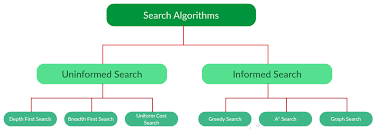Search Algorithms: Unlocking the Secrets to Effective Online Searching
In today’s digital age, search engines have become an integral part of our daily lives. Whether we’re looking for information, products, or services, search engines help us navigate the vast online landscape. But have you ever wondered how search engines are able to deliver relevant results amidst the sea of information available? The answer lies in search algorithms.
Search algorithms are complex mathematical formulas and rules that search engines use to determine the most relevant and useful results for a given query. They are constantly evolving and improving to provide users with the most accurate and up-to-date information.
One of the key aspects of search algorithms is understanding user intent. When you enter a query into a search engine, it tries to decipher what you’re looking for based on various factors such as your location, previous search history, and even your device type. This helps the algorithm tailor the results specifically to your needs.
Another important factor considered by search algorithms is relevance. They analyze web pages and assess their content based on keywords, meta tags, headings, and other elements. By understanding the context and relevance of each page, algorithms can determine which ones are most likely to satisfy a user’s query.
However, search algorithms go beyond simply matching keywords. They also consider factors like website authority and credibility. Websites with high-quality content that is trusted by users tend to rank higher in search results. This encourages website owners to focus on creating valuable content that meets user needs rather than relying solely on keyword stuffing or other manipulative techniques.
Furthermore, search algorithms take into account user experience when ranking websites. Factors such as page loading speed, mobile-friendliness, and ease of navigation play a crucial role in determining how well a website ranks in search results. This ensures that users not only find relevant information but also have a positive experience while interacting with websites.
As technology advances, so do search algorithms. Machine learning and artificial intelligence are now being integrated into search algorithms, allowing them to continuously learn and adapt. These advancements enable search engines to understand natural language queries better, interpret user intent more accurately, and deliver even more personalized results.
For website owners and digital marketers, understanding search algorithms is essential for effective search engine optimization (SEO). By aligning their strategies with the principles of search algorithms, they can improve their website’s visibility and reach a wider audience.
In conclusion, search algorithms are the backbone of modern-day online searching. They work tirelessly behind the scenes to provide users with relevant and useful information. By constantly evolving and adapting, search algorithms ensure that our online experiences are seamless and efficient. So the next time you enter a query into a search engine, remember that there’s an intricate algorithm working tirelessly to bring you the best results possible.
5 Frequently Asked Questions about Search Algorithms Explained (English UK)
- What is a search algorithm?
- How does a search algorithm work?
- What are the different types of search algorithms?
- How can I optimize my website for better search engine results?
- What are the best practices for using search algorithms in web development?
What is a search algorithm?
A search algorithm is a set of rules and calculations used by search engines to determine the most relevant and useful results for a given query. It is a complex mathematical formula that analyzes various factors and signals to rank web pages based on their relevance to the user’s search.
Search algorithms consider multiple elements, such as keyword usage, website authority, user experience, and relevance to determine which web pages should appear higher in search engine result pages (SERPs). These algorithms continuously evolve and improve to provide users with the most accurate and up-to-date information.
The primary goal of a search algorithm is to understand user intent and deliver the most relevant results accordingly. It takes into account factors like location, previous search history, and device type to tailor the results specifically to the user’s needs. By analyzing web page content, meta tags, headings, and other elements, search algorithms assess the context and relevance of each page.
In addition to relevance, search algorithms also consider website authority and credibility. Websites with high-quality content that is trusted by users tend to rank higher in search results. Factors like page loading speed, mobile-friendliness, and ease of navigation also influence how well a website ranks in SERPs.
Search algorithms are constantly evolving as technology advances. Machine learning and artificial intelligence are being integrated into these algorithms, enabling them to continuously learn from user behavior patterns and adapt accordingly. This allows search engines to better understand natural language queries, interpret user intent accurately, and provide even more personalized results.
Understanding search algorithms is crucial for website owners and digital marketers as it helps them optimize their websites for better visibility in search results. By aligning their strategies with the principles of search algorithms, they can improve their website’s ranking position and reach a wider audience.
How does a search algorithm work?
A search algorithm is a complex mathematical formula and set of rules that search engines use to retrieve and rank web pages in response to a user’s query. While the specific workings of search algorithms are proprietary and closely guarded by search engine companies, here is a simplified overview of how they generally work:
- Crawling: Search engines employ automated software called crawlers or spiders to browse the web and discover new web pages. Crawlers follow links from one page to another, collecting information about each page they encounter.
- Indexing: Once a crawler discovers a web page, it analyzes its content, including text, images, and other elements. The relevant information is then stored in a massive database known as an index. This index allows the search engine to quickly retrieve relevant pages when a user enters a query.
- Query Processing: When a user submits a query, the search engine processes it by analyzing the keywords and other elements within the query. It tries to understand the user’s intent and determine what information they are seeking.
- Ranking: Search algorithms evaluate numerous factors to determine the relevance and quality of web pages in relation to the user’s query. These factors include keyword usage, website authority, user experience signals (such as page loading speed and mobile-friendliness), relevance of content, backlinks from other reputable websites, and more.
- Displaying Results: Based on its analysis and ranking process, the search algorithm generates a list of results that best match the user’s query. The most relevant pages are typically displayed at the top of the search results page (SERP), while less relevant ones appear further down.
It is important to note that search algorithms are constantly evolving to provide more accurate results for users. Search engine companies regularly update their algorithms to improve their ability to understand natural language queries, combat spammy or manipulative practices, promote high-quality content, adapt to new technologies, and address emerging trends in user behavior.
While search algorithms are complex and multifaceted, their ultimate goal is to deliver the most relevant and useful information to users based on their queries. By understanding the fundamental principles of search algorithms, website owners and digital marketers can optimize their content and strategies to improve their visibility and reach in search engine results.
What are the different types of search algorithms?
There are several types of search algorithms used by search engines to deliver relevant results to users. Here are a few of the most commonly known types:
- Traditional or Relevance-Based Algorithms: These algorithms analyze the relevance of web pages to a user’s query based on factors such as keyword usage, meta tags, headings, and content quality. Examples include TF-IDF (Term Frequency-Inverse Document Frequency) and Boolean search algorithms.
- PageRank Algorithm: Developed by Google co-founders Larry Page and Sergey Brin, PageRank evaluates the importance of web pages based on the number and quality of links pointing to them. It considers links as votes of confidence, with more authoritative websites carrying more weight in rankings.
- Machine Learning Algorithms: These algorithms use artificial intelligence and statistical models to learn from data and improve over time. They analyze patterns in user behavior, content quality, and other factors to provide personalized search results. Google’s RankBrain is an example of a machine learning algorithm.
- Local Search Algorithms: Designed specifically for local searches, these algorithms prioritize results based on geographic relevance. They consider factors such as location data, proximity to the user’s location, and business listings in local directories.
- Image Search Algorithms: These algorithms analyze visual features such as colors, shapes, sizes, and metadata associated with images to provide relevant image search results. They can also recognize objects within images using object recognition technology.
- Video Search Algorithms: Similar to image search algorithms, video search algorithms analyze video metadata (titles, descriptions) and visual features (thumbnails) to deliver relevant video search results.
- Voice Search Algorithms: With the rise of voice assistants like Siri or Alexa, voice search algorithms have gained importance. These algorithms focus on understanding natural language queries spoken by users rather than typed keywords.
It’s important to note that search engines use a combination of these algorithms simultaneously or sequentially in order to provide the best possible search results. The specific algorithms and their weighting may vary among different search engines, with each company having its own proprietary algorithms to maintain a competitive edge.
How can I optimize my website for better search engine results?
Optimizing your website for better search engine results is crucial to increase visibility and attract organic traffic. Here are some key strategies you can implement:
- Keyword Research: Conduct thorough keyword research to identify relevant keywords and phrases that your target audience is searching for. Use tools like Google Keyword Planner or SEMrush to find high-volume, low-competition keywords.
- On-Page Optimization: Optimize your website’s on-page elements such as title tags, meta descriptions, headings, and URL structure. Incorporate your target keywords naturally within these elements to improve relevancy.
- High-Quality Content: Create valuable, informative, and engaging content that addresses the needs of your target audience. Ensure that your content is unique, well-written, and optimized with relevant keywords. Regularly update your content to keep it fresh.
- Mobile-Friendly Design: With the majority of searches happening on mobile devices, it’s essential to have a responsive design that adapts to different screen sizes. This improves user experience and can positively impact search rankings.
- Page Loading Speed: Optimize your website’s loading speed by compressing images, minifying CSS and JavaScript files, using caching techniques, and choosing a reliable hosting provider. A faster-loading website provides a better user experience and can improve search rankings.
- User-Friendly Navigation: Ensure that your website has a clear and intuitive navigation structure that allows users to easily find the information they’re looking for. Use descriptive anchor text for internal links to help search engines understand the context of linked pages.
- Build Quality Backlinks: Earn high-quality backlinks from reputable websites in your industry or niche. Focus on creating valuable content that naturally attracts links from other websites through guest blogging, influencer outreach, or creating shareable infographics.
- Social Media Integration: Incorporate social sharing buttons on your website to encourage users to share your content on social media platforms. This can help increase visibility and attract more traffic to your website.
- Monitor and Analyze: Regularly monitor your website’s performance using tools like Google Analytics or Search Console. Analyze key metrics such as organic traffic, bounce rate, and conversion rates to identify areas for improvement and track the success of your optimization efforts.
- Stay Up-to-Date with SEO Trends: SEO is an ever-evolving field, so it’s essential to stay updated with the latest trends and algorithm changes. Follow reputable industry blogs, attend webinars, or consider consulting with an SEO professional to ensure you’re implementing the most effective strategies.
Remember, optimizing your website for search engines is a continuous process. By following these strategies and staying committed to providing a positive user experience, you can improve your website’s visibility in search engine results and drive organic traffic to your site.
What are the best practices for using search algorithms in web development?
When it comes to web development and optimizing your website for search algorithms, there are several best practices you can follow to improve your website’s visibility and ranking in search engine results. Here are some key practices to consider:
- Quality Content: Create high-quality, relevant, and original content that provides value to your users. Search algorithms prioritize websites that offer valuable information and address user needs.
- Keyword Research: Conduct thorough keyword research to identify the terms and phrases users are searching for in relation to your website’s topic or industry. Incorporate these keywords naturally into your content, titles, headings, and meta tags.
- On-Page Optimization: Optimize your web pages by ensuring proper title tags, meta descriptions, URL structures, and header tags (H1, H2, etc.). Use descriptive anchor text for internal linking and optimize images with alt tags.
- Mobile-Friendly Design: With the majority of internet users accessing websites on mobile devices, it’s crucial to have a responsive design that adapts seamlessly across different screen sizes. Mobile-friendliness is also a ranking factor in search algorithms.
- Site Speed: Improve your website’s loading speed as it directly impacts user experience. Optimize images, minimize code files, use caching techniques, and choose reliable hosting providers to enhance site performance.
- User Experience: Focus on providing a positive user experience by making navigation intuitive and easy-to-use. Ensure clear site structure with logical hierarchies and use breadcrumbs for easy navigation.
- Backlink Building: Earn high-quality backlinks from reputable websites within your industry or niche. Search algorithms consider backlinks as votes of confidence for your website’s authority and credibility.
- Social Media Integration: Integrate social media sharing buttons on your website to encourage visitors to share your content across various platforms. Social signals can indirectly influence search rankings.
- Regular Updates: Keep your website updated with fresh content regularly through blog posts, articles, or news updates. Regular updates signal to search algorithms that your website is active and relevant.
- Monitoring and Analysis: Utilize web analytics tools to monitor your website’s performance, track keyword rankings, and gain insights into user behavior. Analyze the data to make informed decisions and identify areas for improvement.
Remember that search algorithms are constantly evolving, so staying up-to-date with industry trends and algorithm changes is crucial. Implementing these best practices will help optimize your website for search algorithms, improving its visibility and increasing the likelihood of attracting organic traffic from search engine results pages.



